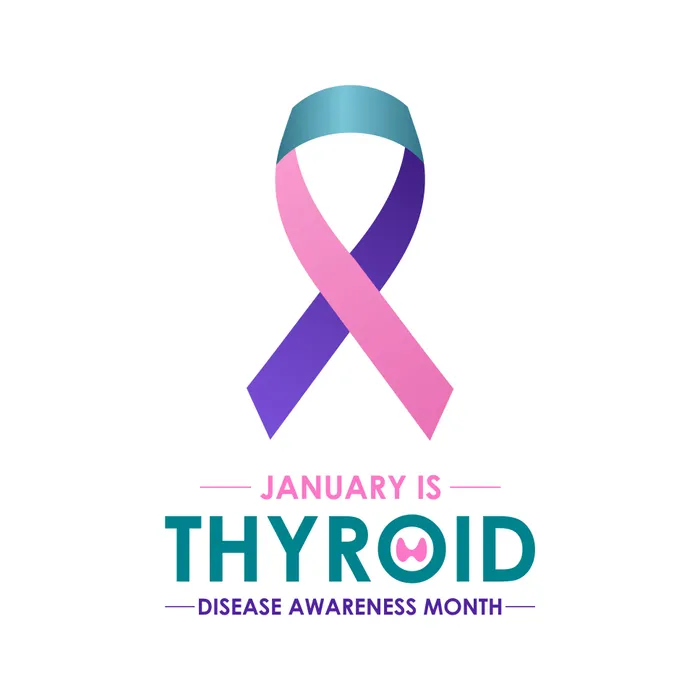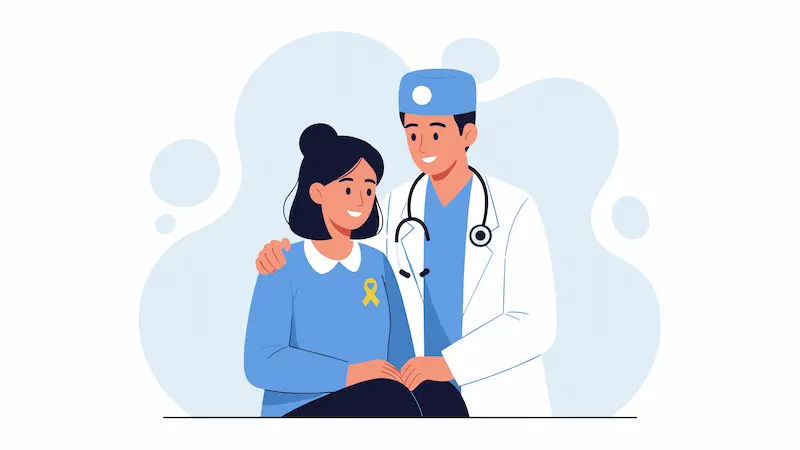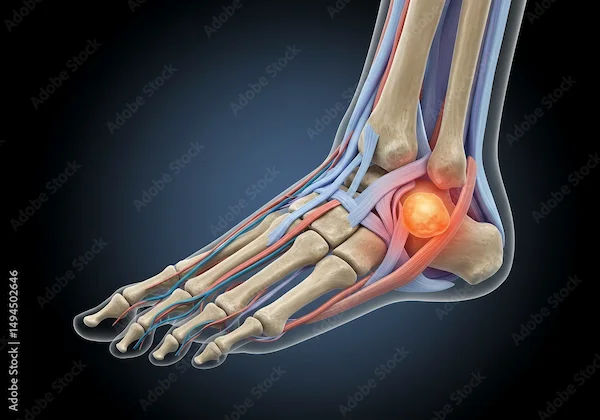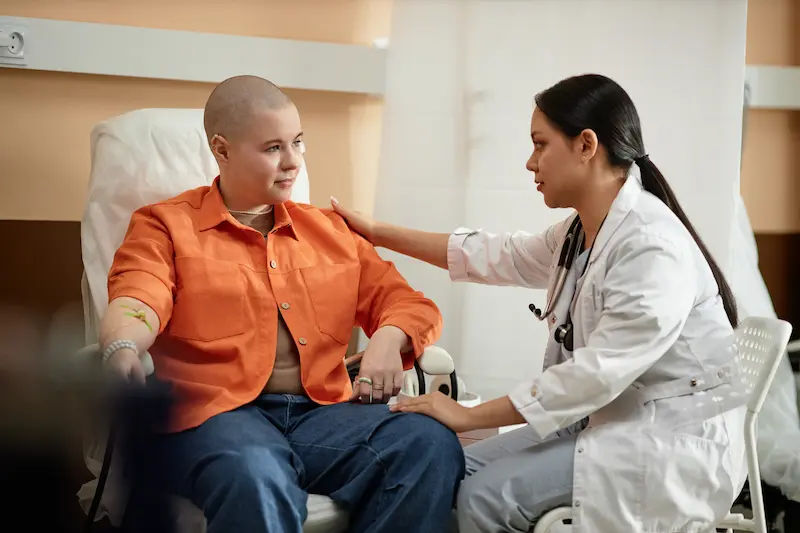Signs Your Cancer Diagnosis Is Not a Terminal Illness
Know about the cancer diagnosis, what do the terminal cancer mean, diagnosis, results, shift from last stage to chronic stage, stages, types, treatment options and more.

Written by Dr. Siri Nallapu
Reviewed by Dr. Shaik Abdul Kalam MD (Physician)
Last updated on 13th Jan, 2026

Introduction
Hearing the word "cancer" can feel like a seismic shock, instantly conjuring fears of the worst-case scenario. For decades, a cancer diagnosis was culturally synonymous with a terminal illness. However, this perception is dangerously outdated. The reality of modern oncology is far more hopeful. The critical understanding to grasp is that a cancer diagnosis is not a single verdict but the beginning of a complex assessment. This article will guide you through the key signs and factors that indicate your cancer is likely treatable, manageable, or even curable. We will move beyond the initial fear to explore the specific medical indicators from cancer type and stage to groundbreaking treatments—that differentiate a terminal prognosis from a highly survivable one.
Decoding the Diagnosis: Terminal vs. Treatable Cancer
The first step in alleviating fear is to understand the precise language used by oncologists. The terms "terminal," "treatable," and "curable" have distinct meanings that significantly impact your outlook and treatment plan.
Consult a Top Oncologist for Personalised Advice
What Does "Terminal" or "End-Stage" Cancer Actually Mean?
A cancer is classified as terminal or end-stage when it has progressed to a point where it cannot be cured or adequately controlled by treatment. The disease is expected to be the cause of death, often within a prognosis of six months or less. Treatment at this stage shifts from curative intent to palliative care, which focuses solely on relieving symptoms, managing pain, and improving quality of life. It's crucial to know that this label is applied only to a specific and advanced circumstance, not to the vast majority of new cancer diagnoses.
The Powerful Shift: From Death Sentence to Chronic Disease
For many cancers, the goal is not just a cure but management. Similar to conditions like diabetes or heart disease, many cancers can be controlled long-term with ongoing therapy. This paradigm shift is one of the most positive signs of progress in oncology. Cancers like chronic lymphocytic leukaemia (CLL) or certain cases of advanced ovarian cancer can be managed for years, even decades, allowing patients to live full lives. The signs of cancer not being terminal often include having treatment options available that can consistently keep the disease in check, turning a once-fatal illness into a chronic condition.
The Most Telling Sign
The Cancer Type and Its Stage The two most significant factors determining whether a cancer is terminal are its type and its stage at diagnosis. This combination provides the first and most concrete evidence of your likely prognosis.
Understanding Cancer Staging (Stage 0 to IV)
Staging describes the extent of cancer within the body. The TNM system (Tumour, Nodes, Metastasis) is commonly used:
Stage 0: Abnormal cells are present but have not invaded nearby tissue (often called "carcinoma in situ"). This is highly curable.
Stages I & II: Cancer is localised to the primary organ. These early-stage cancers typically have excellent cure rates.
Stage III: Cancer has spread to regional lymph nodes but not distant organs. Treatment is often aggressive but can still be curative.
Stage IV: Cancer has metastasised to distant parts of the body. While this is the most advanced stage, it is not automatically terminal. New treatments have made many Stage IV cancers manageable chronic illnesses.
Cancers with High Cure Rates: A Closer Look
The type of cancer is equally important. Some cancers are inherently more treatable than others. For example:
Testicular Cancer: Even when metastatic, the overall cure rate exceeds 95%.
Thyroid Cancer: Most types, like papillary thyroid cancer, have a 5-year survival rate near 100% for localised cases.
Prostate Cancer: Localised prostate cancer has a near 100% 5-year survival rate.
Early-Stage Breast Cancer: When detected early, the 5-year survival rate is 99%.
Hodgkin Lymphoma: This cancer is highly curable, even in advanced stages, with modern chemotherapy regimens.
The presence of one of these cancers with high cure rates is a powerful sign that the diagnosis is far from terminal.
The Prognostic Powerhouse: Your Specific Test Results
Beyond the broad type and stage, the biological details of your specific cancer, revealed through advanced testing, provide profound insights into its behaviour and your treatment options.
Tumour Markers and Genetic Mutations: The Good News They Can Bring
Modern pathology involves analysing the cancer's DNA. The discovery of specific biomarkers can be a very positive sign. For instance, in non-small cell lung cancer, the presence of an EGFR mutation or an ALK rearrangement means there are highly effective targeted therapy pills available that can control the disease for long periods, even if it's Stage IV. Similarly, in breast cancer, testing for HER2 positivity opens the door for drugs like Herceptin, which have dramatically improved outcomes. These genetic mutations are now considered actionable targets, not bad news.
What Your Pathology Report Reveals About Aggressiveness
The pathology report also includes the "grade" of the cancer cells. Grade describes how abnormal the cancer cells look under a microscope.
Low-Grade (Grade 1): The cells are well-differentiated and resemble normal cells. They tend to grow and spread slowly.
High-Grade (Grade 3 or 4): The cells are poorly differentiated or undifferentiated, look very abnormal, and tend to grow aggressively.
A low-grade tumour is generally a more favourable prognostic sign than a high-grade one, indicating a less aggressive disease course.
Your Overall Health: A Critical Factor in Your Favour
The cancer itself is only part of the equation. Your body's ability to withstand and respond to treatment is a major factor in achieving a positive outcome.
How Age and Comorbidities Influence Treatment Success
Generally, younger patients with fewer other health conditions (comorbidities like heart disease, diabetes, or COPD) are better able to tolerate aggressive treatments like surgery, chemotherapy, or radiation, which can improve their chances of success. However, age alone is not a barrier; a patient's physiological age and fitness are more important than their chronological age.
The Role of Performance Status in Predicting Outcomes
Oncologists use a metric called "Performance Status" (e.g., the ECOG scale) to quantify how well a patient can perform ordinary daily activities. A good performance status (e.g., able to carry out all pre-disease activities without restriction) is a strong, independent predictor of better tolerance to treatment and improved survival. If you are otherwise healthy and active, this is a significant positive sign. If you are experiencing unexplained symptoms and are concerned about your health, consulting a doctor for an evaluation is the first step. You can consult a doctor online with Apollo24|7 to discuss your symptoms and family history.
The Treatment Arsenal: Evidence of Effective Options
The availability of multiple, effective treatment modalities is one of the clearest signs that a cancer is not terminal. A terminal prognosis often comes when all standard and experimental options have been exhausted.
When Treatment is Curative-Intent vs. Palliative
The intent behind your prescribed treatment is a major clue. Curative-intent treatment aims to eradicate the cancer. This is common for early-stage diseases and may involve surgery, chemotherapy, and radiation. If your oncologist is discussing a plan with curative goals, this is a definitive sign that your cancer is not considered terminal. Palliative treatment, as mentioned earlier, focuses on comfort, but it's important to note that palliative chemotherapy or radiation can also extend life significantly in many cases.
The Promise of Targeted Therapies and Immunotherapy
The development of immunotherapy and targeted therapies has revolutionised cancer care. Unlike traditional chemotherapy, which attacks all rapidly dividing cells, these treatments precisely target cancer cells or harness the immune system to fight the disease. Cancers that were once death sentences, like certain melanomas or lung cancers, are now being controlled long-term with these drugs. The existence of these options, especially in clinical trials, is a powerful sign of hope and non-terminal status. Apollo24|7 offers convenient home collection for tests like CBC or tumour markers that can help monitor your health during treatment.
Conclusion
Understanding the signs that a cancer diagnosis is not terminal is the first step toward reclaiming a sense of control and hope. The landscape of cancer treatment has evolved dramatically, moving from a blanket fear to a nuanced field of precision medicine. The key lies in the specifics: the stage, the type, the genetic profile, and the ever-expanding arsenal of treatments. If you or a loved one is facing a diagnosis, focus on asking your medical team the right questions. Inquire about the stage, the grade, and whether biomarker testing is recommended. Understand the goal of your treatment—is it curative or aimed at long-term control?
Remember, knowledge is power. Arm yourself with information, partner with a trusted oncology team, and focus on the factors within your control. If you have received a diagnosis and are seeking a second opinion or want to discuss your treatment plan, you can book a physical visit to a specialist with Apollo24|7 to ensure you are on the best possible path forward.
Consult a Top Oncologist for Personalised Advice
Consult a Top Oncologist for Personalised Advice

Dr. Amit Choraria
Surgical Oncologist
18 Years • MBBS, MS (Surgery) Fellow, Surgical Oncology, Tata Medical Center (FSO) Fellow, European Board of Surgery (Surgical Oncology) (FEBS) Fellow, Minimal Access Surgery (FMAS) Fellow, Indian Association of Gastrointestinal Endosurgeons (FIAGES) UICC Fellow, Royal Marsden NHS, London, UK Visiting Scholar, Plastic Reconstructive Surgery, CGMH, Taiwan Fellow, Robotic Surgical Oncology, Vattikuti Foundation, USA
Kolkata
Apollo Multispeciality Hospitals , Kolkata, Kolkata
(75+ Patients)

Dr. Rupam Manna
Radiation Specialist Oncologist
7 Years • MBBS MD(RADIO THERAPY), CCEBDM
Barasat
Diab-Eat-Ease, Barasat

Dr. Sanchayan Mandal
Medical Oncologist
17 Years • MBBS, DrNB( MEDICAL ONCOLOGY), DNB (RADIOTHERAPY),ECMO. PDCR. ASCO
Kolkata
MCR SUPER SPECIALITY POLY CLINIC & PATHOLOGY, Kolkata

Dr. Harsh J Shah
Surgical Oncologist
15 Years • MS, MCh (GI), DrNB (GI)
Ahmedabad
Apollo Hospitals Gandhinagar, Ahmedabad

Dr Supratim Bhattacharyya
Surgical Oncologist
11 Years • MBBS,MS,Mch(Surgical Oncology),Fellowship in Minimally Invasive GI Surgical Oncology and Robotic Surgery
Kolkata
Apollo Multispeciality Hospitals , Kolkata, Kolkata
(25+ Patients)




